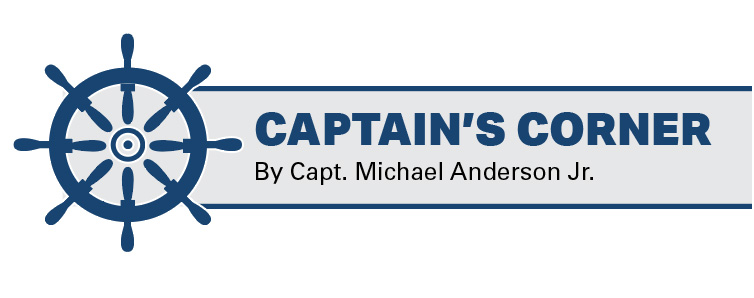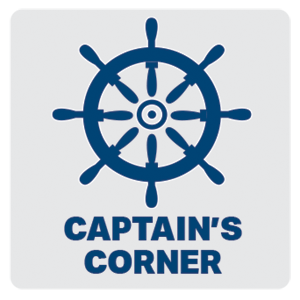 At this point, I believe it’s no secret that finding experienced, qualified and reliable workers has been a challenge for many employers, especially those in the maritime sector: I have touched on this a few times in my past columns.
At this point, I believe it’s no secret that finding experienced, qualified and reliable workers has been a challenge for many employers, especially those in the maritime sector: I have touched on this a few times in my past columns.
Unfortunately, we are continuing to see this trend follow us as we approach the halfway mark of 2022. It has prompted many to ask, “Where have all the mariners gone?”
At first, I really didn’t give it much thought. But I began to have to confront the question more and more as it was coming up almost daily in my line of work. Company representatives calling me to see if we had more labor available, union labor halls calling to see if we had any spare labor available for temporary assignment, friends and colleagues calling me to see if I knew anyone interested in work aboard their vessels starting right away.
Many of the pre-employment requirements that were normal protocol were being waived or lessened to expedite the on-boarding process. Many were given “sign on” monetary bonuses and retainer bonuses to stay longer on a hitch or to entice them to return to the vessel after their completed off time.
As I tried my hardest to place mariners into these vacancies and fill as many of the voids as possible, I felt as if I should address the root of the issue. After talking endlessly with long time industry professionals, current mariners, human resource directors, teachers and guidance counselors and young adults entering the work force, this is my conclusion.
A Multi-Layered Issue
There is no singular answer for the workforce shortage. It is a multi-layered issue with many facets. I’ll start with the obvious. An aging workforce. This has been on the radar of maritime industries for years now and is no secret. COVID–19 only highlighted the issue as many of the workers who were on the cusp of retirement age decided to officially hang it up early or take a job in a safer climate during the pandemic.
This line of work involves lots of travel, living in close proximity to multiple strangers from all over the globe and can be quite hard on the immune system given the lack of quality sleep and stress. I don’t blame anyone who made that choice given the severity of what the world was going through.
Most of the people in that age range were experienced officers, and losing that type of employee hurt much more than losing entry-level personnel to regular turnover woes.
Secondly, obtaining, maintaining and increasing a deck or engine license or rating has never been more difficult. New STCW (Standards of Training, Certification and Watchkeeping) requirements, introduction of Subchapter M (towing vessel safety regulations) and many other renewal regulations has made it more time consuming and more expensive than ever to hold a merchant mariner credential.
I can name quite a few shipmates over the past few years who have gone on to seek work in other industries strictly due to not wanting to have to deal with the U.S. Coast Guard’s ever-increasing list of requirements to renew.
WAfter that, we have the issue of wages and working conditions. When I first was introduced to the Merchant Marine as an 18-year-old kid, it was sold to me as an adventure, not just a job. Money, travel, adventure, time off! Those were the words engrained in my brain, painted bright at the top of the posters in the union halls and uttered time and time again by old-timers trying to convince me to make a career at sea.
It worked: the money was good, the travel was there, the time off was delivered and it was by all means an epic adventure! That’s what kept me coming back. All these things kept me interested and yearning to return and stay with my chosen trade. I would meet other people who had different jobs and hear them talk about their day-to-day work and cringe. I couldn’t understand how a person could sit in chair for eight hours at the same place every day for an entire lifetime.
However, modern innovations and the short turnaround times in port, strict regulations and company policies, pandemic-induced lockdowns, and mariner strandings have convoluted the merchant mariner creed I once knew.
Being restricted to a vessel at sea is one thing. It’s quite another to be restricted while in port during your entire hitch. It is also very stressful to not know if you’ll make your crew change dates or make it home on time due to quarantines, and other variables which have been introduced and must be followed.
Then we have the wages. There aren’t too many mariners becoming wealthy and retiring at 40 from a sailing job. Wages are good, but far from the premiums that were once paid for those who went to sea.
Bonuses and overtime are highly scrutinized, and the bottom line is king. As one former mariner told me: “why would I continue to go to sea when I can get a remote job where I don’t even have to leave the comfort of my house while making 75% of my salary that I normally would at sea where I have to travel across the world, perform dangerous work for 12 hours a day, far away from my family and my home and risk getting sick or stuck somewhere I don’t want to be?”
I didn’t have an answer for him. I guess the point is, if you want people to do things that no one really wants to do, you’re going to have to pay a premium for it. There is a second part to this equation though. There are in fact some people who will not perform this work no matter what the pay. This newest generation seems to value quality of life over money.
We are heading in a very interesting direction as an Industry and as a society. I am optimistic, but I am very curious to see if this workforce shortage is a short-term fad, or a long-term problem that we will be dealing with for years to come. Either way, it has already caused some disruptions in our economic-supply chain, and I hope someone has a solution to help ease the shortage.
I hope high schools can push trades as a viable career choice again. I hope the vocational schools can get the funding to continue to train the next generations of workers. Maybe the Coast Guard will have to loosen some of its policies to streamline credentialing and create more entry-level employable mariners to get in the pipeline.
Aloha, Capt. Michael Anderson Jr.
Capt. Michael Anderson Jr. currently serves as the Regional Director of the Inlandboatmen’s Union of the Pacific, Hawai’i Region. He has worked in the commercial towing industry most of his career both domestically and abroad, most recently sailing as a captain on harbor tugs performing ship assist duties. He also holds both Deck and Engine license/ratings. He resides in Honolulu, Hawaii with his wife Julia.

